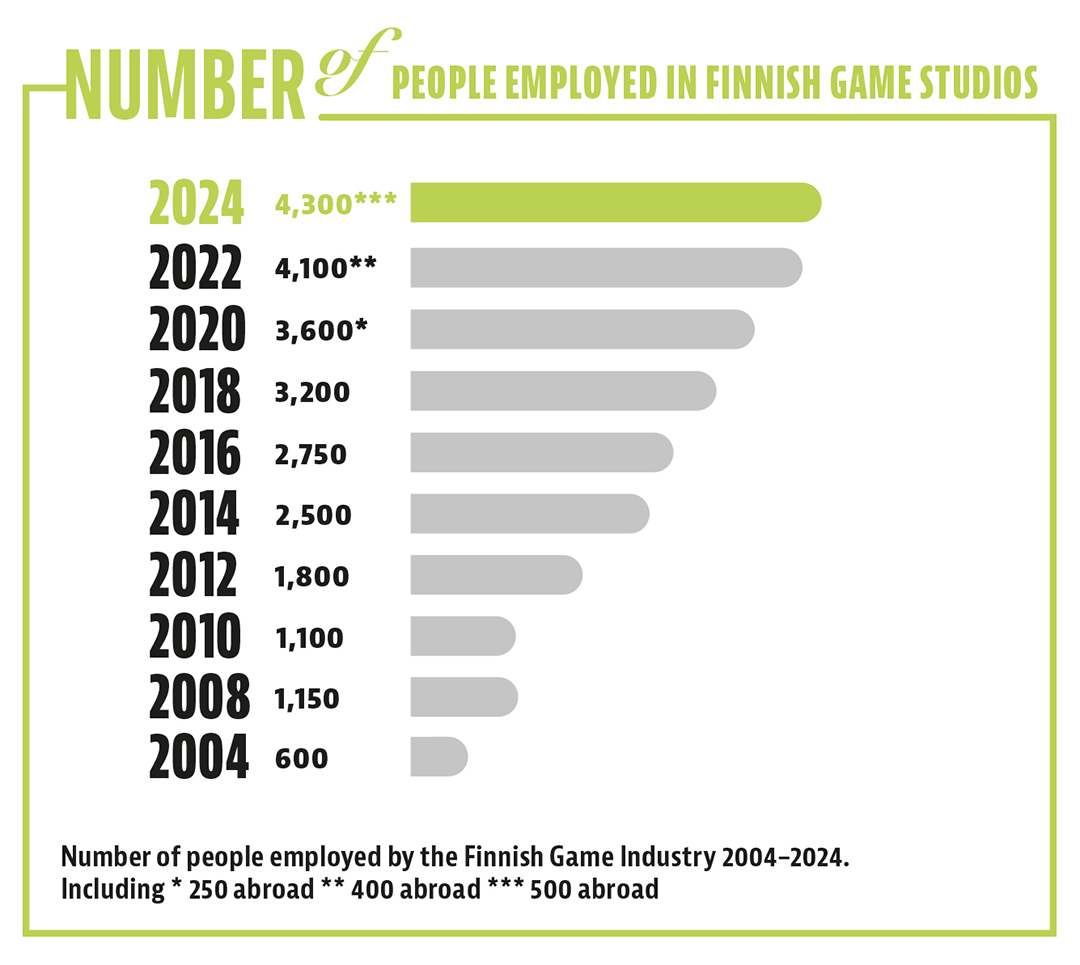
Finnish Game Industry employed 4,300 people by the end of 2024.
IN THIS STUDY, Neogames interviewed 71 game development studios (134 interviews in the last study in 2022). These studios represent approximately 26% of Finnish studios (totaling 270). As all major studios participated in the interviews, the studios interviewed covered a clear majority of the industry's employees and nearly all of its turnover. To ensure there are no gaps in the data, we also collected employee information from public sources, resulting in data from 185 studios (2022 after data collection from public sources: 158). The number of responses to individual questions may vary, as some companies did not answer every question.
The 71 companies interviewed employed 3,058 full-time and 102 part-time staff in Finland at the end of 2024. Information from other available sources confirms that, at the end of 2024, the entire Finnish Game Industry employed approximately 3,800 FTE staff in Finland. In addition to these 3,800 individuals working in Finland, Finnish game studios employed 500 people in Finnish-owned studios abroad.
After a thorough review of the data, we estimate that the total number of people working in Finnish game studios, both in Finland and abroad, reached around 4,300 by the end of 2024 (4,100 at the end of 2022). As in previous reports, these figures also include entrepreneurs.

Dodreams \\ Drive Ahead! Carcade
In 2024, the average number of employees per studio was 20 (2022: 23). This information includes data from both interviewed companies and public resources. Both the number and the share of studios with 0-9 employees increased in 2024, with 127 studios (70%) compared to 84 studios (54%) in 2022. It is important to note that the 2024 data included more companies than the 2022 data.
The growth in the number of employees has not been as rapid as the most optimistic estimates in the previous study (500-1,300 new positions in 2023-2024). Some studios have shut down, and others have had layoffs, resulting in experienced professionals being released into the labor market. Although these individuals were available for employment in other studios, they are not reflected in the figures since they were not new entrants to the industry.
However, Finnish game studios expect to open 450–1,000 new positions in the upcoming two years. Given the volatile nature of the industry, accurately estimating the actual demand for new employees is difficult. Nonetheless, these figures confirm that Finnish game developers are still seeking growth, and the lack of employees remains a challenge for the industry.
Remote working has continued to be common in the Finnish Game Industry, as the majority of the companies interviewed have some employees working mainly remotely. Altogether around 24% of employees in these companies were estimated to work mostly remotely. In 2022 the share was 35%. Cross-border remote work is, despite bureaucratic obstacles, more common than before. Overall, the vast majority of companies allow remote work, and it seems that remote has become established in the industry.

Social First \\ Nexus Station
According to the interviews, the share of female employees in the 71 companies surveyed is around 25%, and has increased from the last study (22% in 2022). This figure applies only to employees working in Finland. However, the number of interviewed companies was smaller than in 2022, so the actual share of female employees in the Finnish Game Industry is expected to be smaller, around 23-24%. As before, the proportion of female employees in the Finnish Game Industry is approximately the same as in other Nordic countries and the average in EU.
Neogames also inquired about the share of other genders, but only a few companies had this information and were able to share it. The amount of data was insufficient to estimate the share of non-binary gender individuals in the Finnish Game Industry. However, a survey conducted by Neogames member We in Games in 2022 suggests that 9% of game industry employees identify themselves as non-binary (4.5% in 2020). It is important to note that these findings are not directly comparable to other statistics in this study due to methodological differences.
The share of non-Finnish employees has been increasing. By the end of 2022, non-Finnish employees represented just over 30% of the workforce, and this figure increased to 37% in the studios surveyed by the end of 2024. This marks an increase of approximately 7 percentage points from the previous study, underscoring the significance of international talent in the Finnish Game Industry. Approximately 19% of the employees from the companies interviewed were from outside the EU/EEA area (compared to 15% in 2022). Again, as the number of interviewed companies in this study was smaller than in 2022, the actual share of non-Finnish employees might be smaller (around 34-35%).